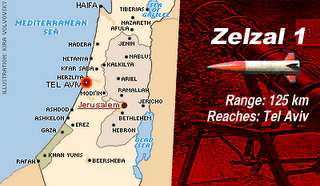
Is cannon fire now being met by muted optimism?
Shares of many U.S. listed-Israeli companies, after initially slumping following Hezbollah's capture of two Israeli soldiers in a cross-border raid on July 12, have either rebounded or remained relatively flat in the last ten trading sessions. For example, the Common Stock prices of software developer AmDocs (DOX-$35.83), Internet security software maker Check Point Software Technologies (CHKP-$16.72), and generic drug maker Teva Pharmaceutical Industries (TEVA-$34.31) climbed/ (fell) from July 12 – July 21 and then climbed/ (fell) from July 24 – August 4, respectively: $1.95 / $(0.77), $(0.65) / $0.18, and $(1.86) / $4.55.
After falling nearly 10% during the first two days of the fighting, the Tel Aviv 100 index was up 3% this past week Our view is that investors believe that historical Israeli economic resilience during past conflicts will stand the test this time around, too.
Dun & Bradstreet (Israel) optimistically points out that the present escalation started in one of the best periods ever in the history of Israel's economy. The research group emphasized that 2005 constituted the best year ever in the history of the Israeli hi-tech industry, as the revenue of leading technology companies increased by 20 percent over 2000, the sector's previous peak year. Industrial exports, which constitute almost 40% of the total industrial product, also increased by 5.6%, after rising 17% in 2004.
Still, workers huddled in bomb shelters are not good for business. The Israeli Manufacturers Association says that reduced activity in factories in Haifa (Israel’s third largest city) and the rest of the North has already caused $500 million in financial damage. According to the latest information collected by the Association's emergency headquarters in the North about 35 percent of the 1,800 factories and small manufacturing businesses in Haifa and the North were shut, about 35% were in partial operation and some 30% were working as usual.
In 2004, Israel was America's 19th leading trade partner, with total trade (imports and exports) totaling more than $26.6 billion.
In 2005, companies based in the States of California, Massachusetts, and New York, respectively, exported over $1.4 billion, $135.3 million, and $4.4 billion worth of manufacturing goods to Israel.
Some of the nation's largest companies, such as IBM, Microsoft, Cisco, and McDonald's are home to Israel (with diverse levels of capital exposure).
The world's largest maker of semiconductor production equipment Applied Materials (AMAT-$15.50) operates a Process Diagnotics and Control business groups in Rehovot that develops and produces control systems for semiconductor equipment and software for real-time monitoring of cluster tools, including laser cleaning technology, advanced defect detection, review and metrology systems.
Networking hardware and software maker 3Com Corporation (COMS-$4.71) operates a manufacturing facility in Tel Aviv.
The maker of everything from Scotch tape to optical glare-reducing films for LCD TV screens and computer monitors, 3M Corp. (MMM-$69.45), has facilities based in Herzlia.
Intel Corporation (INTC-$17.49) first established its design center in Haifa in 1974, then a sales office in Tel Aviv, a manufacturing facility in Jerusalem and recently a $1.6 billion fabrication plan in Kiryat Gat to add to its semiconductor manufacturing capability there.
Despite the business risks endemic to the Middle East, deal making for Israeli-based companies has not slowed down in 2006. To the contrary—this past May, Warren Buffett coughed up $4.0 billion to purchase an 80% stake in the cutting tools company, Iscar MetalWorking (less than eight miles from the border of Lebanon).
On July 26, 2006, the PC giant, Hewlett-Packard (HPQ-$32.44), said it would purchase Mercury Interactive (MERQ.PK-$50.35), an Israeli-American business software producer, for $4.5 billion. This will be HP’s largest acquisition since the Company bought Compaq Computer for $18.9 billion in 2002. It will also turn Mercury's R&D center in Israel into HP's largest software development center worldwide.
U.S. companies investing in Israel are not limited to just computer technology. Israeli medical device and biotech companies have numerous clinical relationships with U.S. companies. For example, Pharmaceutical, O-T-C and medical equipment giant, Johnson and Johnson (NYSE:JNJ-$63.53), has a number of venture initiatives, including one with OMRIX Biopharmaceuticals, Inc. (OMRI-$12.00) to develop and market OMRI’s proprietary fibrin hemostats used to control bleeding during (liver) surgery.
We have painted the aforementioned portraits to remind our readers that U.S. companies are not insulated from the conflict in the Middle East—and we are not talking about oil (fuel prices, etc.). We opine that globalization means that U.S. companies, too, could feel the shock waves from Hamas’ qassam missiles or Hezbollah’s Katyusha rockets landing thousands of miles away.
Despite the prevailing optimism about growth prospects in Israel, should Iranian-supplied Fajr-5 missiles (which have more than five times the range of the cruder Katyusha 122-mm shells—distance of 12 miles—fired in the early days of the conflict) or Zelzal rockets (with a range of 95 – 140 miles) start raining down in Tel Aviv—sentiment will shift quickly.
And let us not even consider the response should an errant missile hit the Western Wall sacred to all Jews—or the surrounding (Muslim) Dome of the Rock and al-Aqsa Mosque.
The Rocket Factor could replace Hurricane Katrina and avian flu concerns as the new “adverse material event” in quarterly filings with the SEC.
On August 3, 2006, cell phone manufacturer Motorola Inc. (MOT--$23.10) dropped the first bomb. In its 10-Q filing with the SEC (under the Risk Factors section) management noted that manufacturing and engineering operations in Israel “could be disrupted as a result of the expanding hostilities in the region.”
For those of us old enough to remember the Cold War with the erstwhile Soviet Union, be prepared to assume the fetal position and (be like Bert the Turtle): Duck and Cover!
[Ed. note: Today with terrorism the new enemy—instead of the Chinese or Soviets—our younger readers can “Duct Tape & Cover!”]
2 comments:
VERY INTERESTING
Thank you--but define "Very Interesting."
Post a Comment